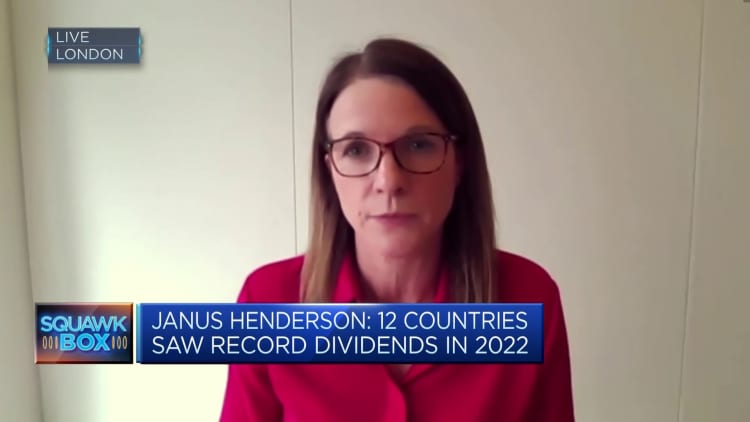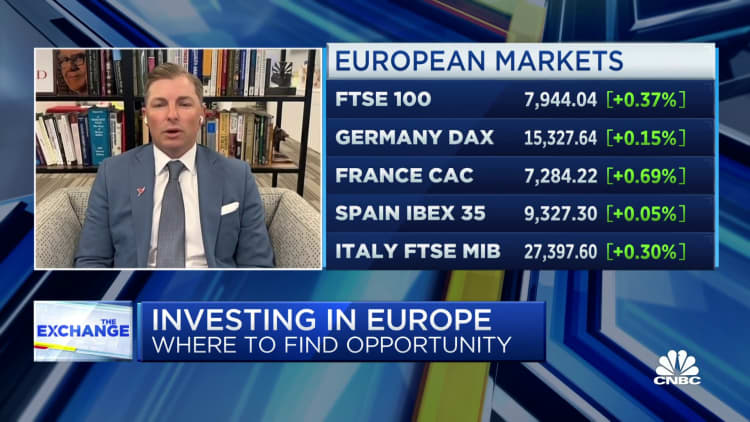- The Wall Street giant highlighted in a note Tuesday that European fourth-quarter earnings showed corporate health extended beyond the region’s bedrock sectors of banking and energy.
- “Regional stock markets have been on a good run year-to-date, but remain at a discount both on a historical basis and versus U.S. peers,” said Helen Jewell, EMEA deputy chief investment officer at BlackRock Fundamental Equities.
LONDON — European corporate earnings were surprisingly resilient in the fourth quarter of 2022, and the continent’s stock outperformance of the U.S. looks set to continue, according to BlackRock.
With earnings season winding down, the Wall Street giant highlighted in a note Tuesday that European fourth-quarter earnings showed corporate health extended beyond the region’s bedrock sectors of banking and energy.
“Companies in Europe surprised analysts with their recent earnings performance. Regional stock markets have been on a good run year-to-date but remain at a discount both on a historical basis and versus U.S. peers,” said Helen Jewell, EMEA deputy chief investment officer at BlackRock Fundamental Equities.
Banks and energy enjoyed a bumper fourth-quarter, BlackRock noted that earnings on the pan-European Stoxx 600 index were up by around 8% annually by the end of February, even without the energy sector.
“Europe is the only region globally where 2024 earnings revisions are just back in positive territory,” Jewell said.
“Earnings in the U.K. have also been a positive surprise, even when adjusted for the size of the financial and energy sectors.”

Jewell suggested that the momentum for European banks, which have been buoyed by positive interest rates, is likely to continue, as valuations remain attractive.
The Euro Stoxx Banks index was up almost 24% year-to-date as of Tuesday morning, but Jewell noted that earnings strength means price-to-earnings ratios remain below long-term averages for the sector.
Price-to-earnings ratio determines whether a company is overvalued or undervalued by measuring its current share price relative to its earnings per share.
“We turned favourable on financials in the middle of last year, and believe the sector is capable of further outperformance in 2023 as the European Central Bank remains committed to inflation control and higher rates may put more banks in a position to return cash to shareholders,” Jewell said.
Energy majors in the U.K. and Europe posted record earnings in the fourth quarter on the back of soaring oil and gas prices, but a warmer winter has since led to lower-than-expected physical demand.
Over the medium term, BlackRock still anticipates supply tightness and sees European oil majors continuing to generate massive cash flows.

“These companies trade at a discount to U.S. peers and continue to allocate substantial investment toward renewable forms of energy,” Jewell added.
Despite the resilience thus far, she highlighted the importance of profit margins in 2023, as central banks continue to tighten monetary policy and bring to an end an era of cheap money.
Around 60% of European companies beat fourth-quarter sales expectations, while only around 50% beat on profits, according to MSCI data compiled at the end of February. A similar picture is emerging in the U.K.
“This tallies with what companies across sectors have told us about the growing impact of wage inflation at a time when slowing economic growth has made it harder to pass on costs. We believe that companies with a higher exposure to wage costs may continue to struggle in 2023,” Jewell said.
“We see many opportunities for investors in the region, although it’s important to be selective as profit-margin pressure may bring dispersion across sectors and within industries.”










